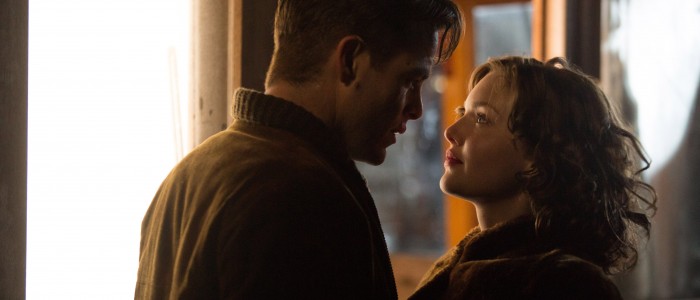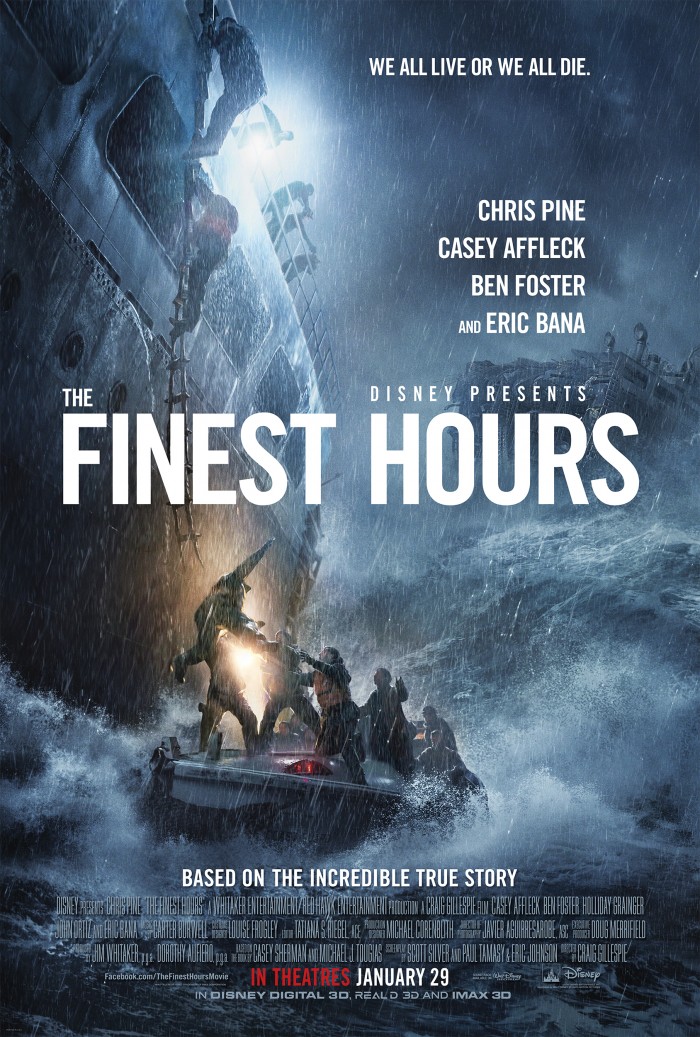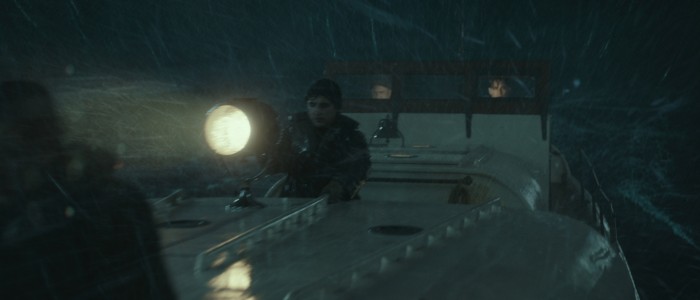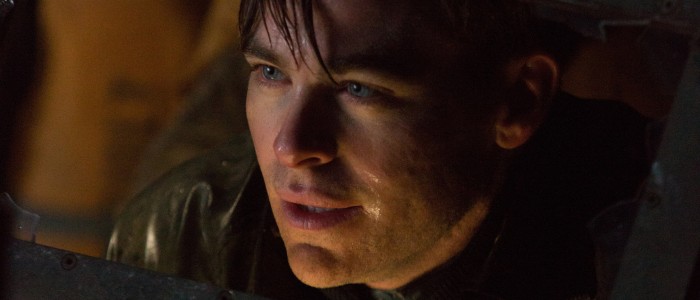Celebrate Veteran's Day With 'The Finest Hours' Trailer; Chris Pine Talks Romance And Real-Life Inspiration
Jack Ryan, Star Trek, and now Wonder Woman star Chris Pine is no stranger to hero roles, but there's something a little different about his next one. The Finest Hours stars Pine as real-life figure Bernie Webber, who on a bitterly cold winter day in 1952 led one of the greatest rescues in the history of the U.S. Coast Guard. And that's without the aid of sci-fi gadgets, superpowered buddies, or a novelist's imagination, mind you.
Webber is an old-fashioned kind of leading man in an old-fashioned kind of movie — one that, according to Pine, rejects modern cynicism in favor of simple, decent earnestness. The new Finest Hours trailer aims to highlight these men's brave deeds, while keeping them grounded in a relatable sort of humanity. Check out the new Finest Hours trailer — and then read our on-set interviews with Pine and director Craig Gillespie — after the jump.
Disney shared the new The Finest Hours trailer online.
The Finest Hours chronicles the events of February 18, 1952, when a brutal nor'easter struck New England. The storm ripped through an oil tanker called the SS Pendleton, literally breaking it in half with over 30 men trapped inside. When word of the disaster reaches the U.S. Coast Guard in Chatham, Massachusetts, Webber and three other men set out on a small lifeboat to save the stranded sailors. The film arrives January 29, 2016 — just a few weeks short of the rescue's 64th anniversary.
Shooting on The Finest Hours took place last fall in Massachusetts, and in November 2014 Disney invited me and a few other journalists to visit the set and speak with Pine and Gillespie. We caught them between takes of a scene set in that humble lifeboat, which was getting slammed by water in a giant tank in a nondescript warehouse. Below, read our interviews with The Finest Hours' director and leading man.
Craig Gillespie Interview
What's it like directing with so much sound? How are you able to communicate with them up there?
[Laughs.] Did you see the last take?
I did, which is why I'm a little curious.
It's good to talk to them before we roll camera and go through what we need. When we're really into some long scenes, a lot of the times I'll be in there with them. But for the stunt stuff, yeah, we'll shoot it from 75 feet away.
So how wet are you getting? Are you getting any of this water on you?
When we're doing the longer scenes, I'll sort of gear up and get out there with them.
How tough is it to make such a small, personal story on such a big, epic production?
It's interesting. What I'm really excited about with this is that they're such idiosyncratic characters. Like, Bernie's really an unusual underdog. He's one of those antiheroes, the reluctant guy, the last person you expect to be that fellow. And the same is going on with [Ray] Sybert, Casey Affleck's role, as well. That character hates authority, doesn't want to be the guy in charge and then ends up being that guy, ironically. So they get to play with some really interesting character traits, which has been fun. And the backdrop is just, it's huge but it's secondary to what's going on. The great part of it is that they're staying in character for all of this, and this whole situation is a catalyst for Bernie, Chris' character, to grow, and the same with Sybert's character. I mean, just the enormity of what they're up against and how that makes them have to step out of their comfort zone.
Can you talk about shooting this movie but knowing that it's going be converted to 3D? Has that affected some of your directing choices?
It does. We're doing a lot of longer takes. I like in 3D that you get to sit in these moves, we're doing these big 50-foot techno moves that come around and get you in the space and you can sort of be there and watch it all and feel a part of it. It's not as fast and, you know, as cut-y as I would do it if it wasn't 3D. I feel it's a better fit for that experience to really feel like you're in the environment. So that's why you see these longer 10-, 12-second moves we're doing with this gimbal so you can really be in their world.
Is this your first 3D feature?
I did Fright Night, which was natural, but this one we're gonna convert.
Is there anything you're looking to as a reference point for post-conversion?
What do you mean?
Like a movie that you looked at that was post-converted and you were like, "Like this."
No, I did Fright Night with the same DP and we have a certain style we like for 3D and we're doing it that way, same lenses.
***
On the next page, Chris Pine talks about the real-life inspiration behind his character and reveals what the cast has been listening to to get through those cold, wet days on set. Plus, check out a new poster.
Chris Pine Interview
So can you tell us about Bernie?
Yeah, Bernie Webber. I didn't get a chance to meet him, obviously. He passed away. I met his daughter. You guys just missed the actual Fitz, Andy Fitzgerald [Kyle Gallner's character] and Gus, his best friend, and that was a great treat. There's a great recording of Bernie talking to an interviewer years and years ago about the rescue and I guess, above and beyond the heroism of it, you can kind of get the sense that he's sick of retelling the story, you know? That, for him, this was his job, this was what he was supposed to do and just like anyone clocking in for a job, his task was going out and saving people, and a real sense that there was no glory in it for him or any need for self-aggrandizement. It was just very simple. So I guess I like the simplicity of the character.
Did you connect to that, as someone who's regularly asked exhaustively about your job?
Uh... no. Well, I mean, to that aspect of it, I suppose, but... no. The temperament of this character seemed altogether different from usually what you encounter in this business which is all about, you know, fame and the glam of it. I don't know if it's just men of a different generation, that's the WWII generation or just immediately after it. There was just a simplicity to the description of it. There was no drama to it. The waves were incredibly huge. What they were going up against was unbelievable in terms of the heroism of these men, but there was this almost metronomic dispatch of facts of events that had taken place: the waves were big, they couldn't see anything, they lost their compass, it was snowing, they were nearly dying of hypothermia. It was the skill of the crew, but also we thought much of divine providence having a great deal to do with it.
So how has watching that interview affected your performance?
I guess, again, he struck me as a very honest, direct, open man. Ben [Foster, who plays Richard Livesey] and I have talked about it, but I really like this idea of men clocking in for the workday. It just so happens on this day, something incredible happened but above and beyond that, it wasn't anything out of the ordinary. People doing the right thing, I don't know. I like the clear-cutness of that, you know?
In your career you've done a lot of physical roles. From what we're seeing on the ship and the gimbel, it looks amazing. It looks like a lot of stamina and energy. Is this the most difficult physical thing you've had to do as an actor?
That's actually kind of great fun. It's like a big rollercoaster ride. It is pretty terrifying when you see all that water coming at you, but it is really fun. Yeah, it gets more difficult when we're out there and they're pounding us with the elements and the wind and we're in a ginormous aluminum box, basically, that just traps the cold weather, the cold air, so it can get difficult. It was a particularly cold morning the other day and definitely the time where I could feel myself just about breaking. And then you see Andy Fitzgerald who was actually out there on the boat and you shut up real fast, as we're in dry suits and I have a heating shirt and the whole bit. It is hard, but it's a nice, easy way for all of us to understand how difficult it may have been. I mean, it's really, really cold, and here I am pretending to steer a boat in no current. The stories of what they had to do with the boats flying out of the water, the rudder's out of the water, they're going down these steep, steep pitches not being able to see anything. It's difficult but it's got no bearing, no comparison to what actually happened.
 I find it kind of ironic that you guys are filming this movie at a time when there are a lot of military guys who out there turning their stories into books and then turning them into movies. It is a very different time. Have you guys talked about that, the fact that, generationally, it's such a different thing? What do you think changed where guys who used to just take it home with them and never talk about it, and now it's suddenly become this, almost a commodity, really?
I find it kind of ironic that you guys are filming this movie at a time when there are a lot of military guys who out there turning their stories into books and then turning them into movies. It is a very different time. Have you guys talked about that, the fact that, generationally, it's such a different thing? What do you think changed where guys who used to just take it home with them and never talk about it, and now it's suddenly become this, almost a commodity, really?
Yeah, I couldn't have articulated it any better. I think we just live in a time of the selfie, so there's a sense that everyone's uniqueness and importance on this planet should be displayed and reveled in, and that there's kind of a piece of glory for everyone. And there's a lot to be said for that because a lot of people do do wonderful things, and it has a lot to do with the internet and the proliferation of different forms of media and media outlets, ways to tell your story, from blogs to pictures to whatever. But yeah, when I talk about the simplicity I really do like those stories. Again, this is a movie, this is entertainment, but if there are themes to explore which are valuable for people to witness and think about, I think ours would be to do right and to do good for no other reason than to do it, that it's just the thing to do which is to be a good man without the need for validation or for encomiums and awards and gifts and all that. It's just to do good is good. Mitzvah is good, you know?
How is it balancing his drive to save everyone with his own personal concern, with his romance there? Because that's really the only thing we get beyond you guys going on this mission in this movie.
I think it makes for great drama. When [producers] Jim [Whitaker] and Sean Bailey originally talked to me about this film, when we were exploring all the different aspects of it, I think what I really responded to above and beyond what I had spoken about before about Bernie, was that in many ways this is like this bizarre, anachronistic film that shouldn't exist now with all the Marvel characters and everything. This is almost like a studio film from the '50s, you know? There's no cursing and people are good and right and love conquers all, and it's really very sweet. There's a sweet earnestness to this film that people will either engage with, or the cynicism of the world will win out, but I hope that people appreciate that. There's these two really beautiful, sensitive, wonderful people in this world and they find great love, and then the story ends and you can imagine them having a family and disappearing into the night and not wanting anything else other than to raise a family and have a good, decent life. [Co-star] Holliday [Grainger] is absolutely wonderful and so beautiful and angelic. I think she's kind of the light in all this, in the dark night of the soul, that we go out on this crazy journey, and we'll return to this really, really warm person that Holliday embodies so well. So it's a great thing for my character to have that and for the audience to root for that. Again, the story's very wonderfully kind of simple. There's no irony in this film. It is what it is.
So you were talking about the earnestness, the simplicity, that kind of working man, common man vibe to it. Is that for you what sets this apart from other "lost at sea" movies?
I think like other great, I don't know, ocean films [laughs], if there are great ocean films, and I'm sure there are... You know, just like space, it's a pretty powerful thing when there are men on something that is uncontrollable and violent, and it's Mother Nature really at its most chaotic. So there's great inherent drama in that, in the unknown, what's underneath the water. But yes, I would say because this is a period film set in a time of the Greatest Generation, or however it's classified. Yes, perhaps it is that. It's a simple story about good men doing great things and it does have an earnest — I don't like the word earnest, but I don't see any other descriptive that's kind of as apropos, it's just what you see is what you get. What was [Robert] Redford's film called again? All Is Lost! It is, in many ways, man against the ocean, man against the sea, man against the elements, can he survive? It's the triumph of the human spirit and all that kind of stuff. And also the really violent beauty of the ocean, it is that. There is something studio film-ish about it, but of a time passed that I think we all really enjoy. I mean, if you just look at the collection of faces in this film it's just great, just great. Good mugs, good like party mugs. Not mine included, but I mean...
They told us that Ben brought on a Jambox. Is there a favorite jam he's played that you've been into?
Right now we're heavy into funk. We have a whole funk thing happening, which couldn't be more in contrast to what we're doing.
Is there a particular song that you're like, "This one"?
No. It's an English funk band, a new English funk band, heavy on the horns.
***
The Finest Hours arrives January 29, 2016. Also starring are Eric Bana and John Magaro.




